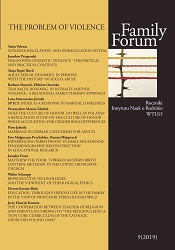Experiencing parenthood in early adulthood. Fenomenographic reconstruction in educational research
Experiencing parenthood in early adulthood. Fenomenographic reconstruction in educational research
Author(s): Ewa Małgorzata Przybylska, Danuta WajsprychSubject(s): Education, Methodology and research technology, Family and social welfare, Demography and human biology, Sociobiology
Published by: Uniwersytet Opolski
Keywords: Family; ambivalence; ambiguity of cultural message; life cycle; early adulthood;
Summary/Abstract: This article attempts to present ways of experiencing parenthood among 17 young adults who have become mothers/fathers. The study was carried out using the phenomenographic method, which sought to describe how the young parents gave meanings to the phenomenon of parenthood; what it meant for them to be a parent. Based on the approach designed by the creators of the phenomenographic research method, we made the epistemological assumption that there is no other world besides the one that an individual experiences. A family was recognised as a special place for learning and experiencing the world, which appears to young adults as a concept of parenthood in their consciousness. The detailed categories of description, revealing concepts of experiencing parenthood, proved to be discursive and strongly context-related. There was considerable ambivalence in the findings, indicating that parenthood fluctuates between polar interpretations of experience and significantly goes beyond an educational context of upbringing. The circumstances accompanying experiencing of parenthood are strongly connected with cultural messages conveyed to groups and individuals by various lifeworld agencies: our interviewees proved to be completely embedded in them. Our findings support the hypothesis that the problem of educational practice connected with experiencing parenthood places it in the world of contemporary culture, which is torn apart by ambiguity and chaos of changing offers, as well as complexity-saturated “reversible” culture, the contents of which are subject to constant reconstruction. This provides essential reasons for developing a theory of lifelong learning in the family.
Journal: Family Forum
- Issue Year: 2019
- Issue No: 9
- Page Range: 151-172
- Page Count: 22
- Language: English

